| Listing 1 - 7 of 7 |
Sort by
|
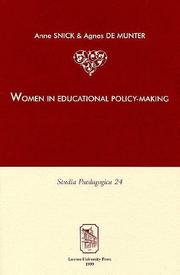
ISBN: 9061869528 Year: 1999 Volume: 24 Publisher: Leuven : University press,
Abstract | Keywords | Export | Availability | Bookmark
 Loading...
Loading...Choose an application
- Reference Manager
- EndNote
- RefWorks (Direct export to RefWorks)
Enseignement --- Europese Unie --- Femmes --- Onderwijs --- Union européenne --- Vrouwen --- Education --- -Education and state --- -Women in education --- -Academic collection --- #PBIB:2002.4 --- Education policy --- Educational policy --- State and education --- Social policy --- Endowment of research --- Children --- Education, Primitive --- Education of children --- Human resource development --- Instruction --- Pedagogy --- Schooling --- Students --- Youth --- Civilization --- Learning and scholarship --- Mental discipline --- Schools --- Teaching --- Training --- Decision making --- Government policy --- Education and state --- Women in education --- Decision making. --- Academic collection --- Book
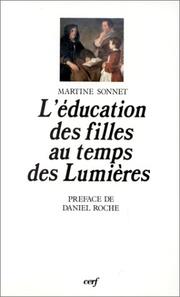
ISBN: 2204026980 9782204026987 Year: 1987 Publisher: Paris : Editions du Cerf,
Abstract | Keywords | Export | Availability | Bookmark
 Loading...
Loading...Choose an application
- Reference Manager
- EndNote
- RefWorks (Direct export to RefWorks)
Intarissable d’éloges sur les bienfaits d’une éducation des filles bien tempérée, la société raisonneuse des Lumières renâcle à passer aux actes. Paris au xviiie siècle est pourvu en écoles propres à satisfaire les aspirations des familles selon leurs moyens, mais ne brillant guère par leurs audaces. Déchiffrer l’abécédaire, apprendre son catéchisme, broder, dessiner, danser ou chanter, tout cela ne compose pour les jeunes filles qu’un piètre bagage, comparé à la culture reçue au collège par leurs frères. En se gardant bien de cultiver des femmes savantes, l’enseignement des filles les confine dans les destins traditionnels, domestiques et religieux assignés à leur sexe.Lieu d’acquisition de savoirs, l’école est aussi un lieu de vie et de travail, reflet des enjeux et des conflits de la vie religieuse, culturelle, économique et sociale du temps. Un bon observatoire pour déceler, archives à l’appui, quelques ombres aux Lumières.
Women --- Education --- History --- -Education --- -Children --- Education, Primitive --- Education of children --- Human resource development --- Instruction --- Pedagogy --- Schooling --- Students --- Youth --- Civilization --- Learning and scholarship --- Mental discipline --- Schools --- Teaching --- Training --- Human females --- Wimmin --- Woman --- Womon --- Womyn --- Females --- Human beings --- Femininity --- -History --- -Women --- to 1914 --- to 1914. --- To 1914. --- Developmental psychology --- anno 1700-1799 --- France --- Girls --- Femmes --- Histoire --- Women - Education - France - History - 18th century. --- Education - France - History - 18th century. --- FRANCE --- FEMMES --- CONDITIONS SOCIALES --- EDUCATION --- 18E SIECLE --- Enlightenment --- Book
Book
ISBN: 0304326879 0304326887 Year: 1994 Publisher: London Cassell
Abstract | Keywords | Export | Availability | Bookmark
 Loading...
Loading...Choose an application
- Reference Manager
- EndNote
- RefWorks (Direct export to RefWorks)
Hoe verhoudt zich de kwaliteit van het onderwijs t.o.v. gelijkheid van kansen binnen het onderwijs. De auteur van dit boek gaat ervan uit dat deze twee begrippen met elkaar verbonden zijn. Als basis van een goed onderwijs zijn deze twee kenmerken noodzakelijk. In deze publikatie wordt de kwaliteit van het Britse onderwijssysteem onderzocht. De impact van de wetgeving op het gebied van onderwijs, zoals o.a. de "Education Reform Act" van 1988, wordt besproken. Een korte historische schets van het Britse onderwijssysteem toont ons het verschillende onderwijs dat werd verstrekt niet alleen naargelang het geslacht van de leerlingen maar ook naargelang hun sociale klasse. Verder worden de resultaten weergegeven van een onderzoek naar de schoolervaringen en toekomstverwachtingen van zwarte en witte meisjes in scholen met gescheiden onderwijs en deze die co-educatie als hefboom tot gelijkheid zien. Ten slotte wordt het management van scholen geanalyseerd.
School management --- Great Britain --- Sex differences in education --- -Education and state --- -Discrimination in education --- -Education --- -Children --- Education, Primitive --- Education of children --- Human resource development --- Instruction --- Pedagogy --- Schooling --- Students --- Youth --- Civilization --- Learning and scholarship --- Mental discipline --- Schools --- Teaching --- Training --- Educational discrimination --- Race discrimination in education --- Education --- Affirmative action programs in education --- Segregation in education --- Education policy --- Educational policy --- State and education --- Social policy --- Endowment of research --- Aims and objectives --- Government policy --- -Aims and objectives --- -Sex differences in education --- Discrimination in education --- Education and state --- Onderwijsorganisatie --- Groot-Brittannië --- Equal opportunities --- Single-sex education --- Management --- Girls --- Racism --- Social class --- Legislation --- Blackness --- Book --- Co-education --- Experiences
Book
ISBN: 2847880615 2847884246 Year: 2004 Publisher: Lyon : ENS éditions,
Abstract | Keywords | Export | Availability | Bookmark
 Loading...
Loading...Choose an application
- Reference Manager
- EndNote
- RefWorks (Direct export to RefWorks)
In 1791 Condorcet passionately defended “common education for both sexes in mixed schools” as a democratic measure - but his words fell on deaf ears. Nine decades later, the Republicans opted for single-sex schools when they created state secondary education for girls. Despite the spread of co-education in the United States and elsewhere, mixed-sex education remained a Utopia in late 19th century France. It was not until 1976 that mixed-sex education became the norm at all levels of education and was no longer the subject of debate and controversy. However, we now know, as Geneviève Fraisse wrote, that “mixed-sex education is necessary, but not sufficient, to break down persistent inequalities”. The history of this pedagogical revolution, its opponents and defenders, its successes and failures, had not yet been fully recorded. In this volume, historians and sociologists present us with analyses from the distant and recent past as well as comparisons with other European countries where mixed-sex education is the subject of debate. Whereas the issue of mixed-sex education has become a subject of public debate, its history and challenges deserve mention as they show the extent to which putting boys and girls together has never been purely a question of gender management. It affects society as a whole.
Coeducation --- Education --- Sex discrimination in education --- Coéducation --- Enseignement --- Discrimination sexuelle en éducation --- History --- History. --- Histoire --- Sociology of occupations --- Social policy --- Educational systems. Teaching systems --- Teaching --- Secondary education --- Higher education --- Personnel management --- anno 1800-1899 --- anno 1900-1999 --- Europe --- Education. --- Coeducation. --- Single-sex classes (Education) --- Single-sex schools --- Children --- Education, Primitive --- Education of children --- Human resource development --- Instruction --- Pedagogy --- Schooling --- Students --- Youth --- Civilization --- Learning and scholarship --- Mental discipline --- Schools --- Training --- mixité --- université --- éducation --- enseignement secondaire --- Teachers --- Career --- Government policy --- Academic sector --- Book --- Co-education
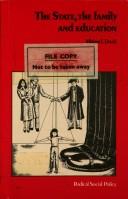
ISBN: 0710006012 Year: 1980 Publisher: London
Abstract | Keywords | Export | Availability | Bookmark
 Loading...
Loading...Choose an application
- Reference Manager
- EndNote
- RefWorks (Direct export to RefWorks)
De auteur onderzoekt vanuit socialistisch-feministisch standpunt op welke manier de vrouw als ouder, leerkracht en leerling, betrokken is bij het onderwijssysteem. Meer bepaald onderzoekt ze de relatie tussen gezin en onderwijs en hoe de overheid in een kapitalistische samenleving deze relatie reguleert. Haar centraal standpunt is dat de overheid zowel gezin als onderwijssysteem gebruikt om de sociale en economische status-quo te behouden en te reproduceren. Eén voorbeeld hiervan is hoe in schoolprogramma's de stereotiepe rollenverdeling in het gezin wordt doorgegeven.
Sociology of education --- Home and school --- -Education --- -Students --- -Parent and child --- -Teacher-student relationships --- -Pupil-teacher relationships --- Student and teacher --- Student-teacher relationships --- Students and teachers --- Teacher and student --- Teacher-pupil relationships --- Teachers and students --- Interpersonal relations --- Child and parent --- Children and parents --- Parent-child relations --- Parents and children --- Children and adults --- Parental alienation syndrome --- Sandwich generation --- Pupils --- School life --- Student life and customs --- Students --- Persons --- Education --- Children --- Education, Primitive --- Education of children --- Human resource development --- Instruction --- Pedagogy --- Schooling --- Youth --- Civilization --- Learning and scholarship --- Mental discipline --- Schools --- Teaching --- Training --- School and home --- Parent-teacher relationships --- Parents' and teachers' associations --- Economic aspects --- -Legal status, laws, etc --- Parent and child --- Teacher-student relationships --- Legal status, laws, etc. --- -Economic aspects --- -Home and school --- Legal status, laws, etc --- Sociologie van het onderwijs --- Capitalism --- Upbringing --- Government --- Socialization --- Book --- Economy
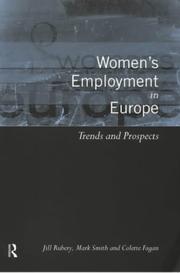
ISBN: 0415198542 0415198534 0203411005 9786610050253 128005025X 0203402251 1134639910 9780203402252 9780415198547 9780415198530 0429230923 6610050252 9781134639915 9781134639861 1134639864 9781134639908 1134639902 9780429230929 Year: 1999 Publisher: London New York Routledge
Abstract | Keywords | Export | Availability | Bookmark
 Loading...
Loading...Choose an application
- Reference Manager
- EndNote
- RefWorks (Direct export to RefWorks)
Based on extensive original research, this volume examines contemporary patterns of womens employment in Europe in the context of the profound economic, social and cultural changes that have taken place in recent years. It considers the progress made towards equal treatment in the labour market in the light of European Union action programmes, and examines the prospects for womens employment under the fourth action programme. The authors conclude that progress towards equal treatment will only occur when gender issues are fully integrated into the European Commissions employment and labour mar
Labour market --- Sociology of the family. Sociology of sexuality --- Europe --- Women --- Labor market --- Manpower policy --- Employment forecasting --- Femmes --- Marché du travail --- Emploi --- Employment --- Politique gouvernementale --- Prévision --- -Labor market --- -Manpower policy --- -Women --- -#SBIB:AANKOOP --- #SBIB:316.346H22 --- #SBIB:316.334.2A341 --- 396.5 <4> --- Human females --- Wimmin --- Woman --- Womon --- Womyn --- Females --- Human beings --- Femininity --- Employment policy --- Human resource development --- Labor market policy --- Manpower utilization --- Labor policy --- Labor supply --- Trade adjustment assistance --- Employees --- Market, Labor --- Supply and demand for labor --- Markets --- Forecasting, Employment --- Economic forecasting --- -Positie van de vrouw in de samenleving: arbeid en beroep --- Arbeidssociologie: ongelijkheden op de arbeidsmarkt: de vrouw en de arbeidsmarkt --- Vrouwenarbeid. Vrouwentewerkstelling. Werkende vrouwen--Europa --- Government policy --- Supply and demand --- Forecasting --- Women - Employment - European Union countries. --- Labor & Workers' Economics --- Business & Economics --- 396.5 <4> Vrouwenarbeid. Vrouwentewerkstelling. Werkende vrouwen--Europa --- Marché du travail --- Prévision --- European Union --- #SBIB:AANKOOP --- Positie van de vrouw in de samenleving: arbeid en beroep --- E-books --- Family --- Pay gap --- Working hours --- Sexual division of labour --- Participation --- Unemployment --- Policy --- Paid labour --- Book --- Sex differences --- Economy
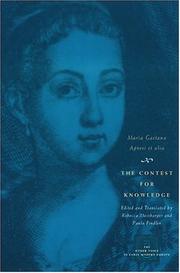
ISBN: 1281125261 9786611125264 0226010562 9780226010564 9780226010540 0226010546 9780226010557 0226010554 9781281125262 6611125264 Year: 2005 Publisher: Chicago University of Chicago Press
Abstract | Keywords | Export | Availability | Bookmark
 Loading...
Loading...Choose an application
- Reference Manager
- EndNote
- RefWorks (Direct export to RefWorks)
At a time when women were generally excluded from scholarly discourse in the intellectual centers of Europe, four extraordinary female letterate proved their parity as they lectured in prominent scientific and literary academies and published in respected journals. During the Italian Enlightenment, Maria Gaetana Agnesi, Giuseppa Eleonora Barbapiccola, Diamante Medaglia Faini, and Aretafila Savini de' Rossi were afforded unprecedented deference in academic debates and epitomized the increasing ability of women to influence public discourse. The Contest for Knowledge reveals how these four women used the methods and themes of their male counterparts to add their voices to the vigorous and prolific debate over the education of women during the eighteenth century. In the texts gathered here, the women discuss the issues they themselves thought most urgent for the equality of women in Italian society specifically and in European culture more broadly. Their thoughts on this important subject reveal how crucial the eighteenth century was in the long history of debates about women in the academy.
Women --- Education --- Children --- Education, Primitive --- Education of children --- Human resource development --- Instruction --- Pedagogy --- Schooling --- Students --- Youth --- Civilization --- Learning and scholarship --- Mental discipline --- Schools --- Teaching --- Training --- Human females --- Wimmin --- Woman --- Womon --- Womyn --- Females --- Human beings --- Femininity --- History --- Intellectual life --- Social conditions --- Italy --- Italia --- Italian Republic (1946- ) --- Italianska republika --- Italʹi︠a︡nskai︠a︡ Rėspublika --- Italie --- Italien --- Italii︠a︡ --- Italii︠a︡ Respublikasi --- Italiĭsʹka Respublika --- Itālija --- Itālijas Republika --- Italijos Respublika --- Italikē Dēmokratia --- Īṭāliyā --- Italiya Respublikasi --- It'allia --- It'allia Konghwaguk --- İtalya --- İtalya Cumhuriyeti --- Iṭalyah --- Iṭalye --- Itaria --- Itaria Kyōwakoku --- Jumhūrīyah al-Īṭālīyah --- Kgl. Italienische Regierung --- Königliche Italienische Regierung --- Laško --- Lýðveldið Ítalía --- Olasz Köztársaság --- Olaszország --- Regno d'Italia (1861-1946) --- Repubblica italiana (1946- ) --- Republiḳah ha-Iṭalḳit --- Włochy --- Yidali --- Yidali Gongheguo --- Ιταλική Δημοκρατία --- Ιταλία --- Итальянская Республика --- Италианска република --- Италия --- Италия Республикаси --- Італьянская Рэспубліка --- Італія --- Італійська Республіка --- איטאליע --- איטליה --- רפובליקה האיטלקית --- إيطاليا --- جمهورية الإيطالية --- イタリア --- イタリア共和国 --- 意大利 --- 意大利共和国 --- 이탈리아 --- 이탈리아 공화국 --- Sardinia (Italy) --- Sociology of the family. Sociology of sexuality --- Italian literature --- Medaglia Faini, Diamante --- Agnesi, Maria Gaetana --- Barbapiccola, Giuseppa Eleonora --- Savini Rossi, Aretafila --- anno 1700-1799 --- knowledge, education, italy, women, gender, italian enlightenment, aretafila savini de rossi, diamante medaglia faini, giuseppa eleonora barbapiccola, maria gaetana agnesi, equality, feminism, nonfiction, history, virtue, career, capacity, intelligence, sexuality, chastity, poetry, philosophy, marriage, masculinity, femininity, domesticity, learning, family, descartes. --- Feminism --- Intellectuals --- Enlightenment --- Book
| Listing 1 - 7 of 7 |
Sort by
|

 Search
Search Feedback
Feedback About UniCat
About UniCat  Help
Help News
News